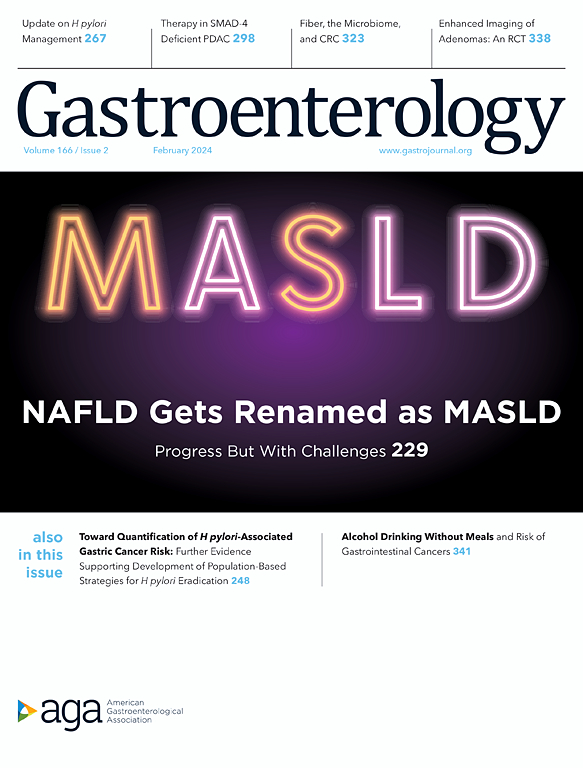治疗中重度溃疡性结肠炎的先进疗法疗效比较:2024 年美国胃肠病协会证据综述
IF 25.7
1区 医学
Q1 GASTROENTEROLOGY & HEPATOLOGY
引用次数: 0
摘要
背景& 目的我们进行了一项最新的系统综述和网络荟萃分析,为 2024 年美国胃肠病学协会(AGA)关于中重度溃疡性结肠炎(UC)治疗的临床指南提供信息。方法我们检索了 2023 年 11 月 21 日前的多个电子数据库,以确定针对中重度 UC 成人患者的随机对照试验,并将不同的先进疗法(肿瘤坏死因子拮抗剂、维多利珠单抗、鞘氨醇-1-磷酸受体调节剂、白细胞介素 12/23 或选择性白细胞介素 23 拮抗剂和 Janus 激酶 [JAK] 抑制剂)与安慰剂或其他活性比较物进行比较。我们的主要结果是诱导和维持临床缓解,次要结果是内镜改善。我们采用频数法进行了网络荟萃分析,并应用推荐、评估、发展和评价分级法(GRADE)对证据的确定性进行了评估。结果在排除作为潜在一线治疗的JAK抑制剂后(根据美国食品和药物管理局的规定),低确定性证据支持英夫利西单抗、奥扎尼莫德、利桑珠单抗和古谢库单抗比阿达木单抗和米利珠单抗对中重度UC患者的临床重要获益,利桑珠单抗和奥扎尼莫德对诱导临床缓解的获益最高。在将JAK抑制剂作为一线疗法的情况下,与除奥扎尼莫和利桑珠单抗以外的所有其他药物相比,奥达帕替尼的疗效更佳,其证据具有低度至中度确定性。在既往有生物制剂暴露的患者中,达帕替尼、托法替尼和乌斯特库单抗的缓解率最高。结论通过对证据质量进行 "推荐、评估、发展和评价分级",这项更新的网络荟萃分析将用于为治疗生物制剂无效和有生物制剂暴露的中重度UC患者提供先进疗法的疗效比较和定位信息。本文章由计算机程序翻译,如有差异,请以英文原文为准。
Comparative Efficacy of Advanced Therapies for Management of Moderate-to-Severe Ulcerative Colitis: 2024 American Gastroenterological Association Evidence Synthesis
Background & Aims
We performed an updated systematic review and network meta-analysis to inform the 2024 American Gastroenterological Association (AGA) Clinical Guidelines on the management of moderate-to-severe ulcerative colitis (UC).
Methods
We searched multiple electronic databases through November 21, 2023, to identify randomized controlled trials in adults with moderate-to-severe UC, comparing different advanced therapies (tumor necrosis factor antagonists, vedolizumab, sphingosine-1-phosphate receptor modulators, interleukin 12/23 or selective interleukin 23 antagonists, and Janus kinase [JAK] inhibitors) against placebo or another active comparator. Our primary outcomes were induction and maintenance of clinical remission, and our secondary outcome was endoscopic improvement. We performed a network meta-analysis using a frequentist approach and applied Grading of Recommendations, Assessment, Development and Evaluation (GRADE) to appraise certainty of evidence.
Results
After excluding JAK inhibitors as potential first-line treatment (in accordance with the United States Food and Drug Administration), low-certainty evidence supports clinically important benefit with infliximab, ozanimod, risankizumab, and guselkumab over adalimumab and mirikizumab for achieving remission with induction therapy in biologically naïve patients with moderate-to-severe UC, with risankizumab and ozanimod being ranked the highest for induction of clinical remission. With the inclusion of JAK inhibitors as first-line therapy, upadacitinib was more efficacious compared with all other medications except ozanimod and risankizumab, with low- to moderate-certainty evidence. In patients with prior biologic exposure, upadacitinib, tofacitinib, and ustekinumab were ranked highest for achieving remission.
Conclusions
Using Grading of Recommendations, Assessment, Development and Evaluation to appraise quality of evidence, this updated network meta-analysis will be used to inform comparative efficacy and positioning of advanced therapies for the treatment of biologic-naïve and biologic-exposed patients with moderate-to-severe UC.
求助全文
通过发布文献求助,成功后即可免费获取论文全文。
去求助
来源期刊

Gastroenterology
医学-胃肠肝病学
CiteScore
45.60
自引率
2.40%
发文量
4366
审稿时长
26 days
期刊介绍:
Gastroenterology is the most prominent journal in the field of gastrointestinal disease. It is the flagship journal of the American Gastroenterological Association and delivers authoritative coverage of clinical, translational, and basic studies of all aspects of the digestive system, including the liver and pancreas, as well as nutrition.
Some regular features of Gastroenterology include original research studies by leading authorities, comprehensive reviews and perspectives on important topics in adult and pediatric gastroenterology and hepatology. The journal also includes features such as editorials, correspondence, and commentaries, as well as special sections like "Mentoring, Education and Training Corner," "Diversity, Equity and Inclusion in GI," "Gastro Digest," "Gastro Curbside Consult," and "Gastro Grand Rounds."
Gastroenterology also provides digital media materials such as videos and "GI Rapid Reel" animations. It is abstracted and indexed in various databases including Scopus, Biological Abstracts, Current Contents, Embase, Nutrition Abstracts, Chemical Abstracts, Current Awareness in Biological Sciences, PubMed/Medline, and the Science Citation Index.
 求助内容:
求助内容: 应助结果提醒方式:
应助结果提醒方式:


